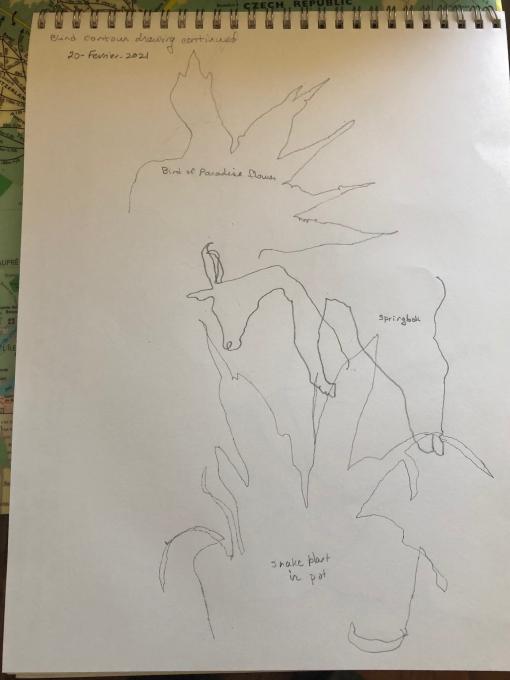The Cornell Lab Bird Academy › Discussion Groups › Nature Journaling and Field Sketching › Focusing on Your Subject – Blind Contour Drawing
-
 Never heard of this. First art class - I read through the other replies and said umm - umm to all of the comments. Flower, et all are really hysterical. This requires more attention for sure.
Never heard of this. First art class - I read through the other replies and said umm - umm to all of the comments. Flower, et all are really hysterical. This requires more attention for sure. -
 My contour drawings resemble monsters. Second tries did not improve much. Gauging the distance of long lines throws me off. I did focus on the subject. I also took note of the "negative spaces," which might have contributed to my disappointing results. I'd love to hear tips and tricks, if anybody has some.
My contour drawings resemble monsters. Second tries did not improve much. Gauging the distance of long lines throws me off. I did focus on the subject. I also took note of the "negative spaces," which might have contributed to my disappointing results. I'd love to hear tips and tricks, if anybody has some. -
This was harder than I expected. I don't know how you guys who chose "thousand stemmed " cactus did this. Anyway, my amaryllis flower was good but it had a disjointed stem. The bird was the easiest and I was hesitant to try the springbok. In that position I felt like he might jump away any minute and I couldn't get him in action. He didn't. I had to forget his action and focus on his shape. Good lesson.
-
Strangely, the pictures that I thought were going to be the easiest turned out to be harder for me. I thought the Newt and the Sunbird would have been easy and turns out it was the one I had the hardest time with. I can never seem to join my lines together...they are always way off..so much so that my puppy has no head! Maybe I should have a different starting point!



-
I like blind contour drawing. The 1st one I do is always the worst one. It's takes 1-2 for me to get the feel of things and keep the marks I make in perspective to the size/shape of the subject. My results almost always both make me laugh, and then feel a little bit of skill coming in, when a contour gets pretty close to "right."
-
Very tricky exercise. I tended to start out well with the shapes, and got some small details right, but never ended up back where I started. I tried doing them going round in different directions, but not much different. It will be worth doing more practice with this technique.
-
It was a difficult experience, I am more of a multiple lines type of drawing. however, some were easier than others. I had an easier time with the bird of paradise flower since it was composed of main lines. The Green tail sunbird was my second best. Not sure why the Orange spotted Newt was as hard as the Springbok. This is my first time taking a drawing class and I am learning so much. Very much appreciated. Le
-
This was fascinating. I hadn’t done this type of drawing before and I found I would start in the upper left hand and work my way clockwise. When I looked down I would find that the upper half from the 11 o’clock to the 3 o’clock would be fairly ok but the the 4 o’clock to 10 o’clock would be way more distorted, larger, and tilted down such that my lines never even got close to meeting. I am gonna call it a night but I wonder if I tried to do the same thing but started counterclockwise drawing from the 2 o’clock position if it would have similar warping or opposite warping. So cool!
-
 Here's my backyard contour drawing. I've done this type of exercise before, 20 plus years ago, as part of a drawing class. It is a little funny to see the outcome, but it does help to focus the eye on the subject. It took a bit of practice to get that focus.
Here's my backyard contour drawing. I've done this type of exercise before, 20 plus years ago, as part of a drawing class. It is a little funny to see the outcome, but it does help to focus the eye on the subject. It took a bit of practice to get that focus. -
This exercise was really hard for me. My eyes constantly wanted to shift down to the paper. By the fourth drawing I had better control at concentrating on the subject. I also found myself rushing through the drawing. I will need to practice more so that I can

 control this.
control this. -
Contour drawing is fun but actually it's a little hard because I get pretty tempted to see my paper and where my hand is. Even though it's hilarious at the end, it helped me to keep my focus on the subject and I noticed tiny details on the outline of it as well.



-
This was a really difficult exercise. I found the most difficult part was knowing where my hand was on the page. This meant that my end did not get back to my beginning. I think I was able to do the curve shapes pretty well and some of the smaller details.
 But anywhere where there was a long thin part did not get aligned. I’ve marked in red on my photo the places I think I did okay at.
But anywhere where there was a long thin part did not get aligned. I’ve marked in red on my photo the places I think I did okay at. -
 I thought I was doing well but to my surprise I definitely lost it on the left side. I think the blind contour drawing is a great exercise and I will continue to use it to improve my eye-hand coordination.
I thought I was doing well but to my surprise I definitely lost it on the left side. I think the blind contour drawing is a great exercise and I will continue to use it to improve my eye-hand coordination. -
It seemed that I did better when I started on the top side of my subject. It also helped me to look at the negative space around the subject.

-
- This exercise definitely made me slow down and concentrate on the outline of the subjects. It was hard in the beginning not to look at the paper, but by the 4th subject I was so lost in the form I didn't mind not being able to look. My results were quite laughable, however, I could see part of each drawing that was spot on. These were usually the small details of the claws, tail or antlers. This was really fun.

- This exercise definitely made me slow down and concentrate on the outline of the subjects. It was hard in the beginning not to look at the paper, but by the 4th subject I was so lost in the form I didn't mind not being able to look. My results were quite laughable, however, I could see part of each drawing that was spot on. These were usually the small details of the claws, tail or antlers. This was really fun.
-
I found this kind of like playing the piano, knowing where your hands are on the keys without looking, is like knowing where your pencil is with respect to everything you've already drawn.

-
I like your analogy of the blind contour experience with playing the piano. I believe that it is pathways from eye to hand that we are training. It's also like typing or keyboarding.
-
-
Observations about this exercise with the four photos:
- Really need to think about matching my drawing speed with my observation speed around the boundary of the subject.
- Trying to coordinate where I'm drawing on the physical page with the composition and layout of the subect.
- Need to concentrate on both drawing speed in both horizontal and vertical dimensions across the page.
- Have to worry about parallax with 3D objects, especially if they are close.


-
yes it enhanced concentration and attention to detail. hardest part was to get the volume, proportion and ends to meet!
-
My ability to gauge how far I've moved across the page is pretty limited. I am wondering a bit about hand speed and beats of time as a way to improve, but probably there's also a lot of figuring out angles.

-
 I really enjoyed this exercise. As I went from photo one to photo 4 my drawings improved. I did the first two twice each and noticed that as I concentrated on the photo and drew areas that were close together I was able to get more accuracy. I covered the sketch pad with my copied photos so I was not tempted to peek. The more I concentrated on observing the photos the more accurate my drawings became. It was fun!
I really enjoyed this exercise. As I went from photo one to photo 4 my drawings improved. I did the first two twice each and noticed that as I concentrated on the photo and drew areas that were close together I was able to get more accuracy. I covered the sketch pad with my copied photos so I was not tempted to peek. The more I concentrated on observing the photos the more accurate my drawings became. It was fun! -
 I really enjoyed this exercise. As I went from photo one to photo 4 my drawings improved. I did the first two twice each and noticed that as I concentrated on the photo and drew areas that were close together I was able to get more accuracy. I covered the sketch pad with my copied photos so I was not tempted to peek. The more I concentrated on observing the photos the more accurate my drawings became. It was fun!
I really enjoyed this exercise. As I went from photo one to photo 4 my drawings improved. I did the first two twice each and noticed that as I concentrated on the photo and drew areas that were close together I was able to get more accuracy. I covered the sketch pad with my copied photos so I was not tempted to peek. The more I concentrated on observing the photos the more accurate my drawings became. It was fun! -
 Very good exercise for focusing on the subject! I superimposed each contour drawing on top of the other, using colors of the subject that were harmonious with each other. The copper for the tropical bird didn't work, though, and looks grey. The outcome is a playful abstract design - and within the design one can see suggestions of a head-horn-ears, tail, and feet....Lots of fun!
Very good exercise for focusing on the subject! I superimposed each contour drawing on top of the other, using colors of the subject that were harmonious with each other. The copper for the tropical bird didn't work, though, and looks grey. The outcome is a playful abstract design - and within the design one can see suggestions of a head-horn-ears, tail, and feet....Lots of fun! -

-
I liked blind contour drawing to focus my attention on what I am actually seeing; I'm not worried it isn't a true likeness.
-
-
The more often I practice this, the better I get at moving my eyes and pencil in concert. Muscle memory is definitely taking place.
-
I think I drew too quiuckly, but it was an interesting exercise, and made me look more closely at the outlines.
Read More:
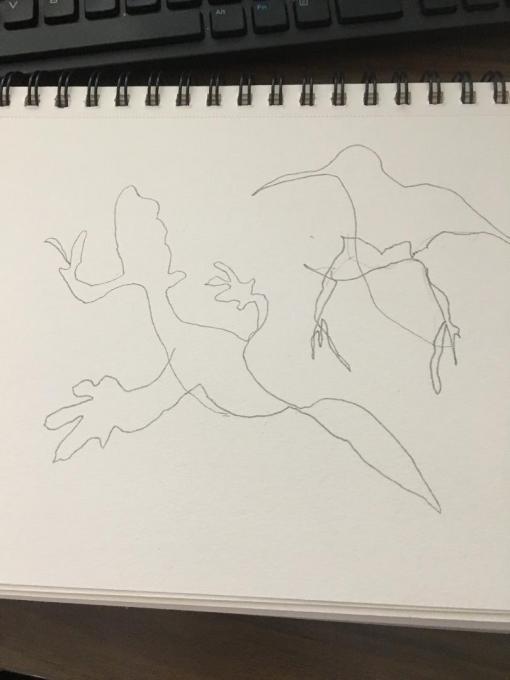 Never heard of this. First art class - I read through the other replies and said umm - umm to all of the comments. Flower, et all are really hysterical. This requires more attention for sure.
Never heard of this. First art class - I read through the other replies and said umm - umm to all of the comments. Flower, et all are really hysterical. This requires more attention for sure. 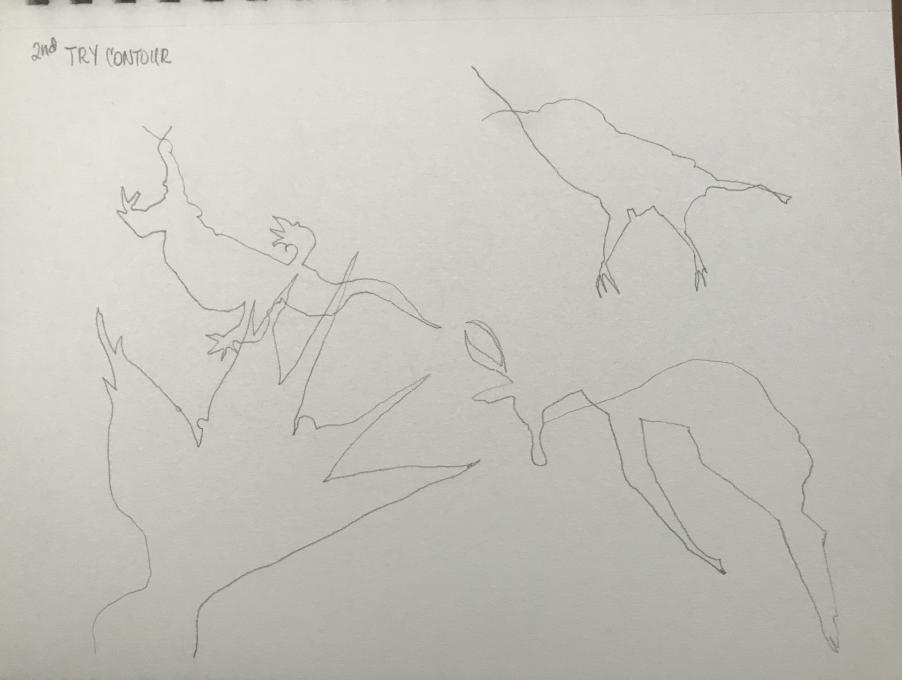 My contour drawings resemble monsters. Second tries did not improve much. Gauging the distance of long lines throws me off. I did focus on the subject. I also took note of the "negative spaces," which might have contributed to my disappointing results. I'd love to hear tips and tricks, if anybody has some.
My contour drawings resemble monsters. Second tries did not improve much. Gauging the distance of long lines throws me off. I did focus on the subject. I also took note of the "negative spaces," which might have contributed to my disappointing results. I'd love to hear tips and tricks, if anybody has some. 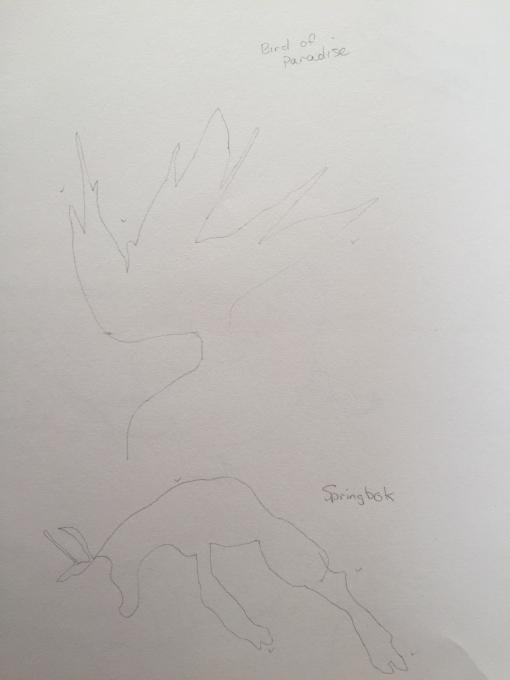
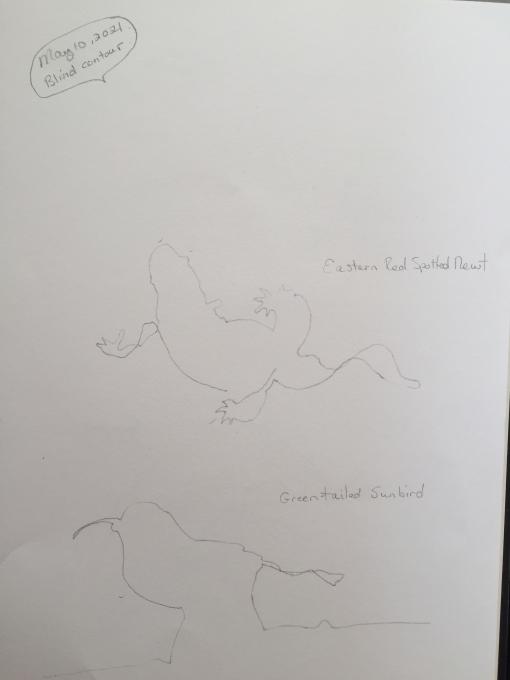
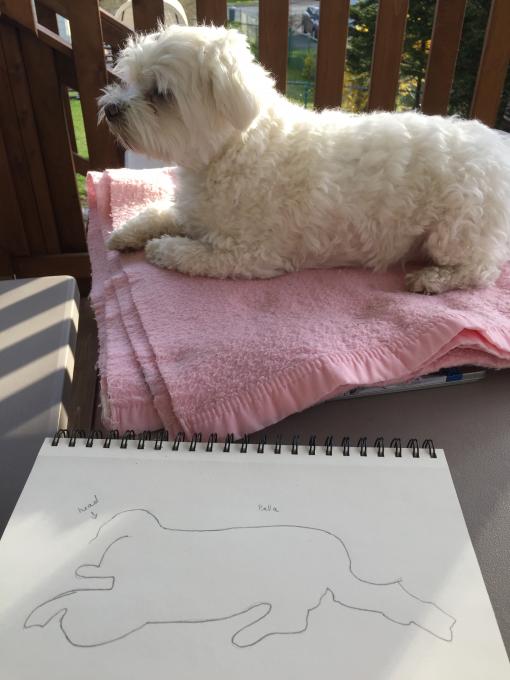
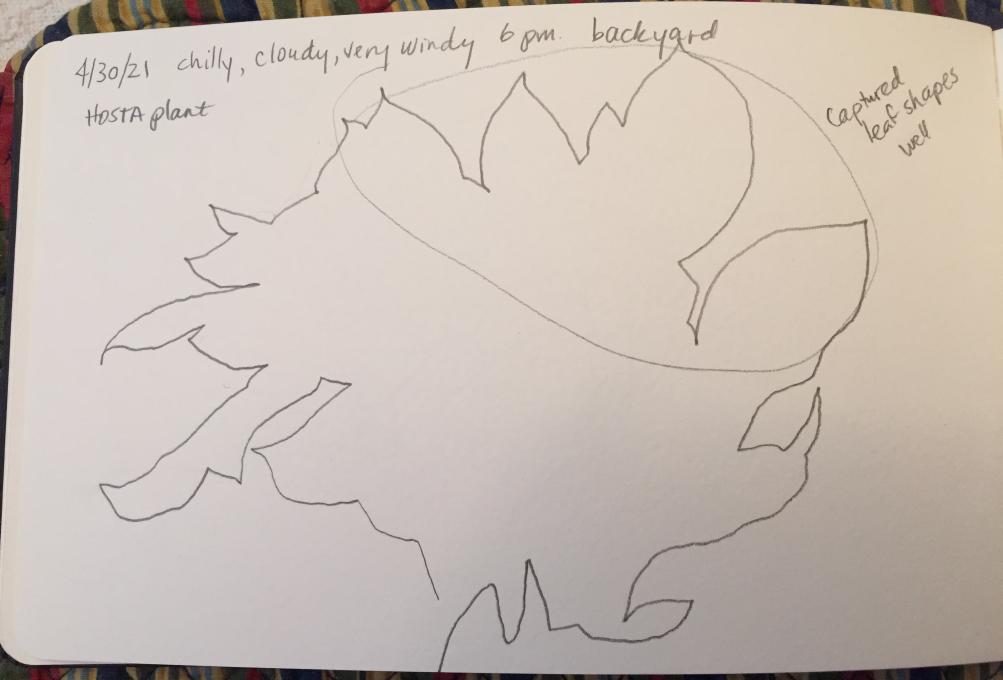 Here's my backyard contour drawing. I've done this type of exercise before, 20 plus years ago, as part of a drawing class. It is a little funny to see the outcome, but it does help to focus the eye on the subject. It took a bit of practice to get that focus.
Here's my backyard contour drawing. I've done this type of exercise before, 20 plus years ago, as part of a drawing class. It is a little funny to see the outcome, but it does help to focus the eye on the subject. It took a bit of practice to get that focus. 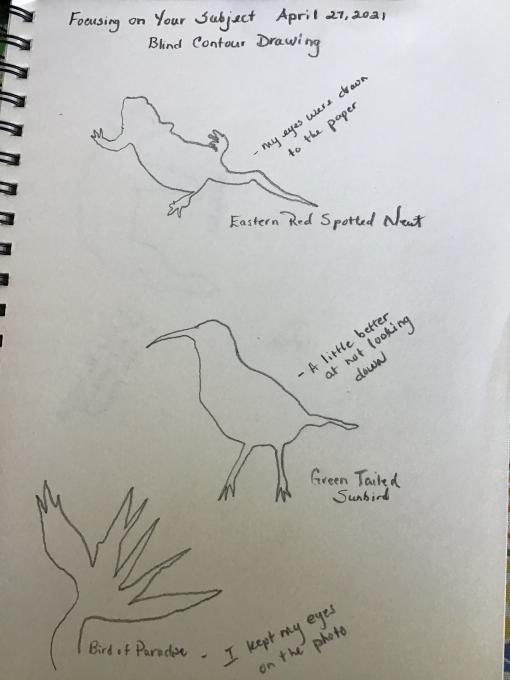
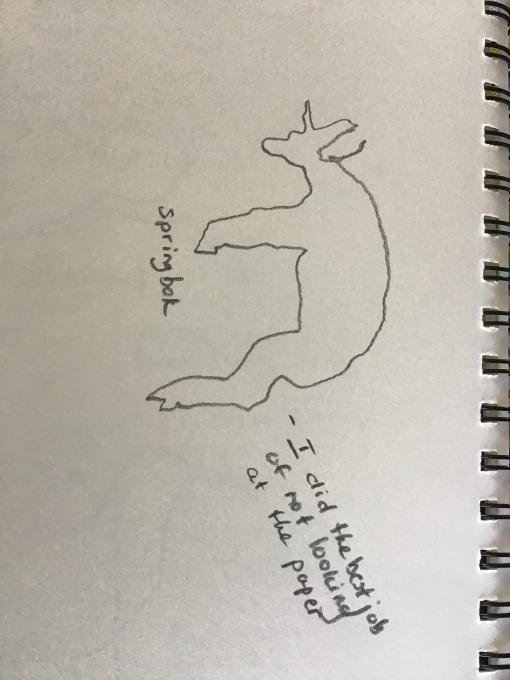 control this.
control this. 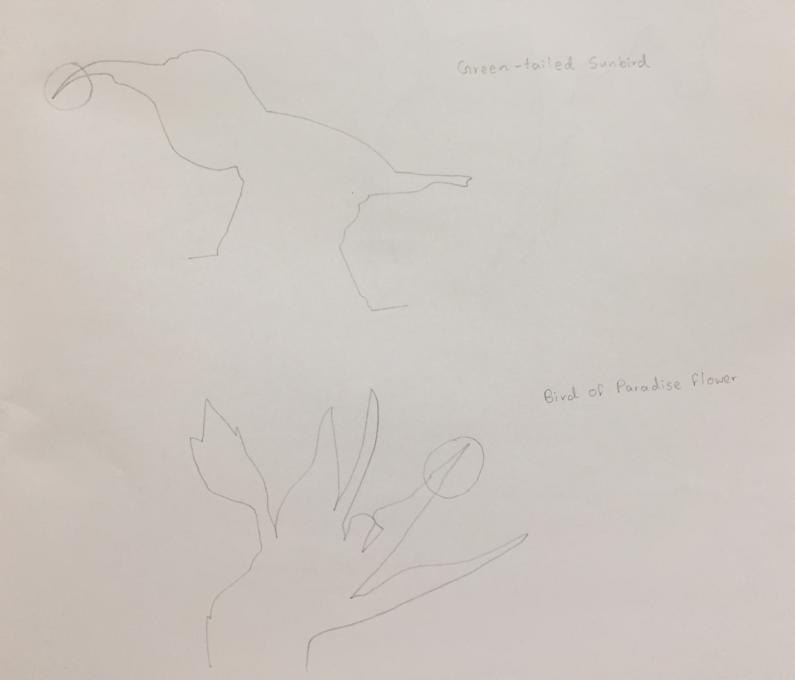
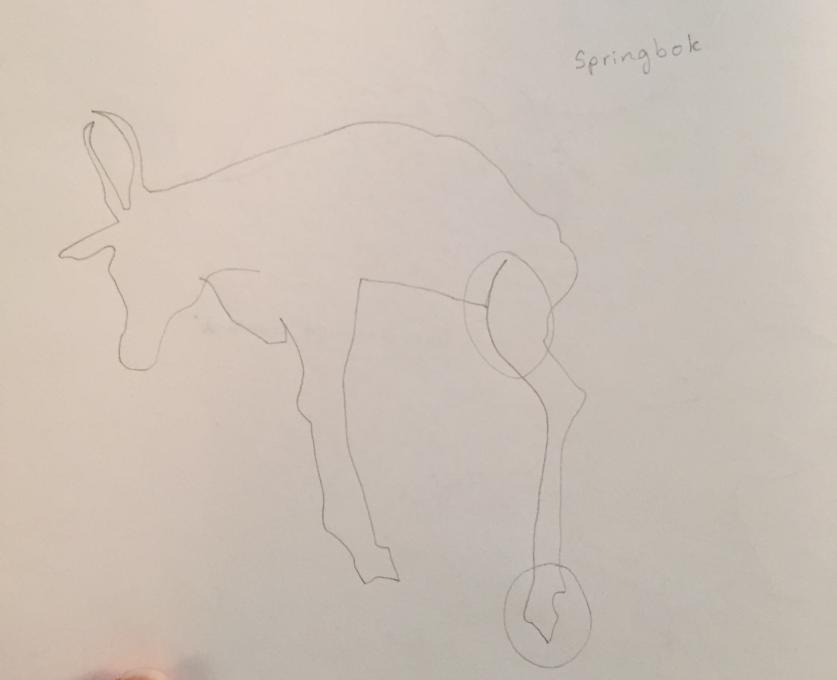
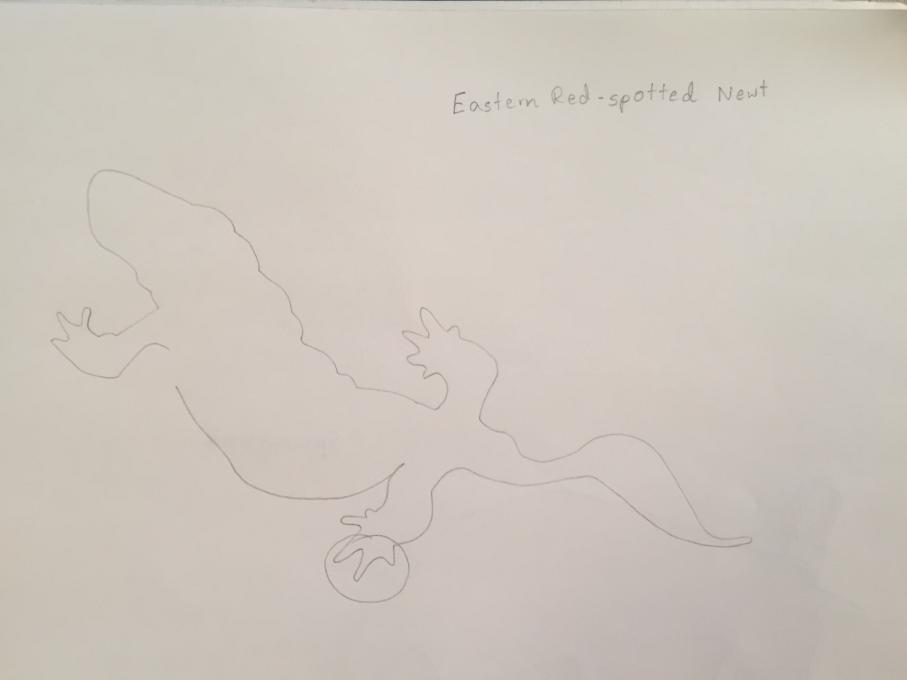
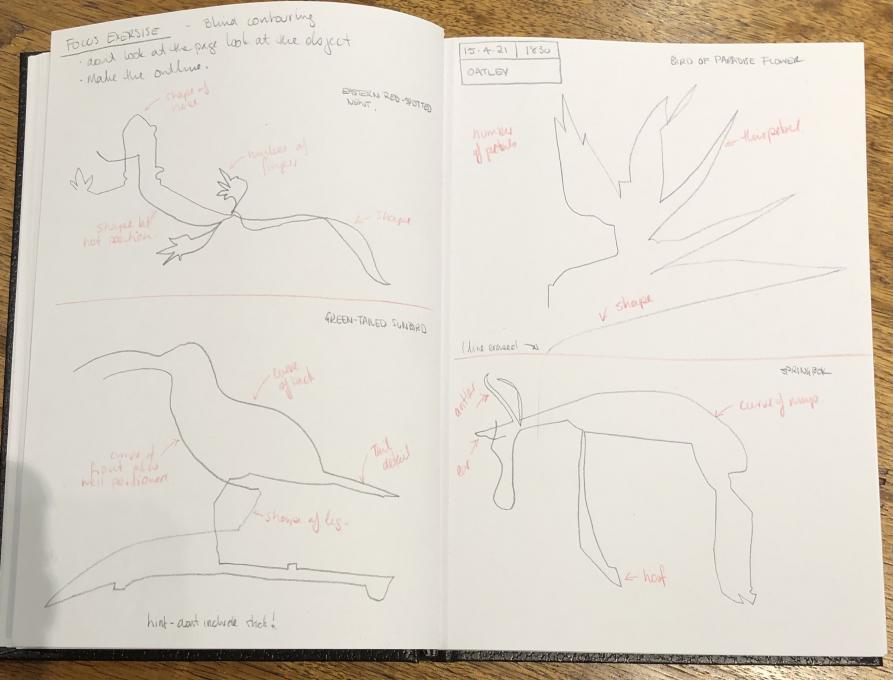 But anywhere where there was a long thin part did not get aligned. I’ve marked in red on my photo the places I think I did okay at.
But anywhere where there was a long thin part did not get aligned. I’ve marked in red on my photo the places I think I did okay at. 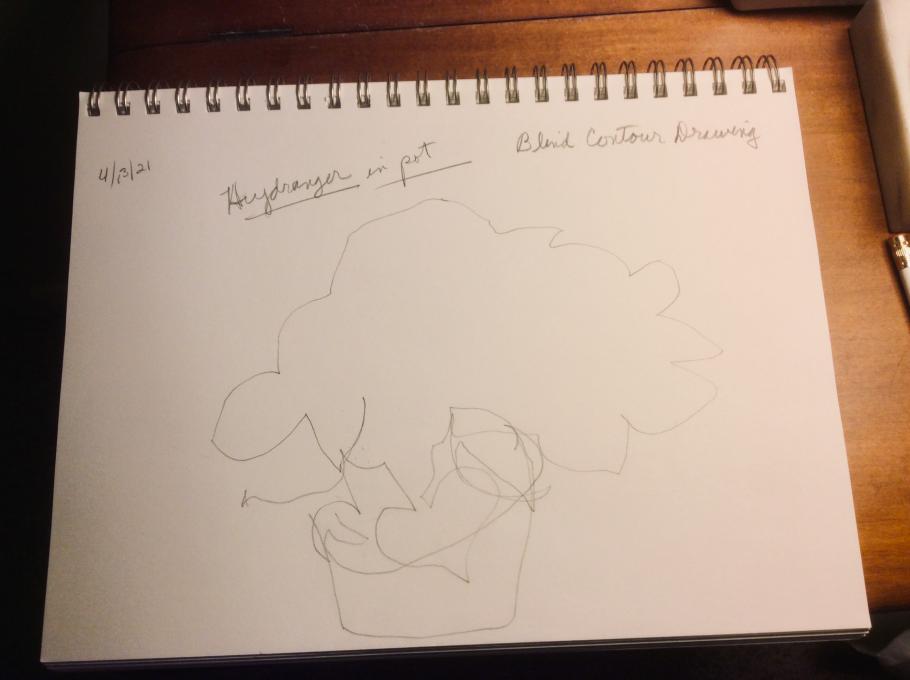 I thought I was doing well but to my surprise I definitely lost it on the left side. I think the blind contour drawing is a great exercise and I will continue to use it to improve my eye-hand coordination.
I thought I was doing well but to my surprise I definitely lost it on the left side. I think the blind contour drawing is a great exercise and I will continue to use it to improve my eye-hand coordination. 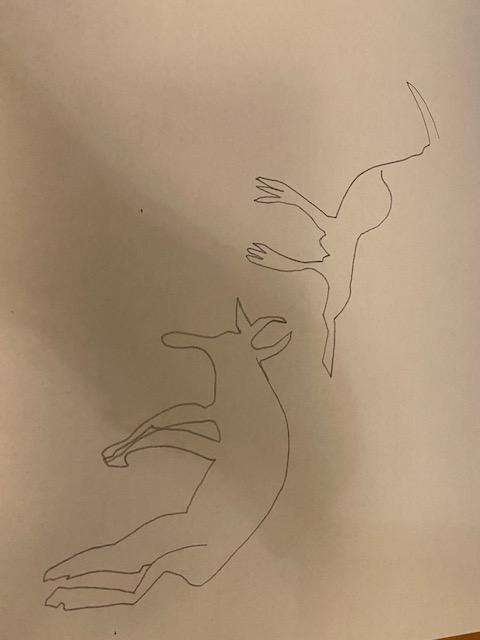
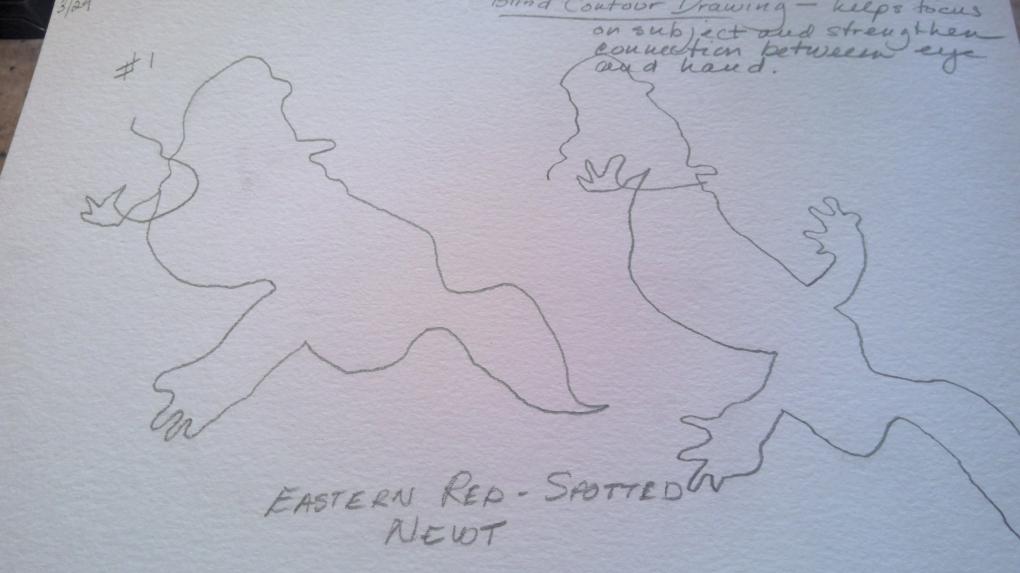
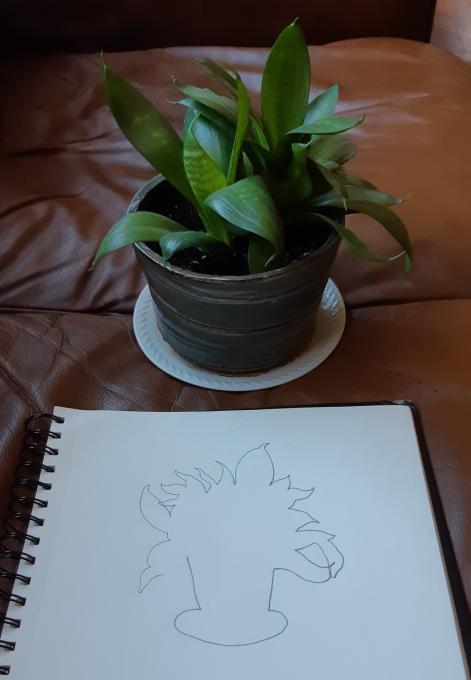
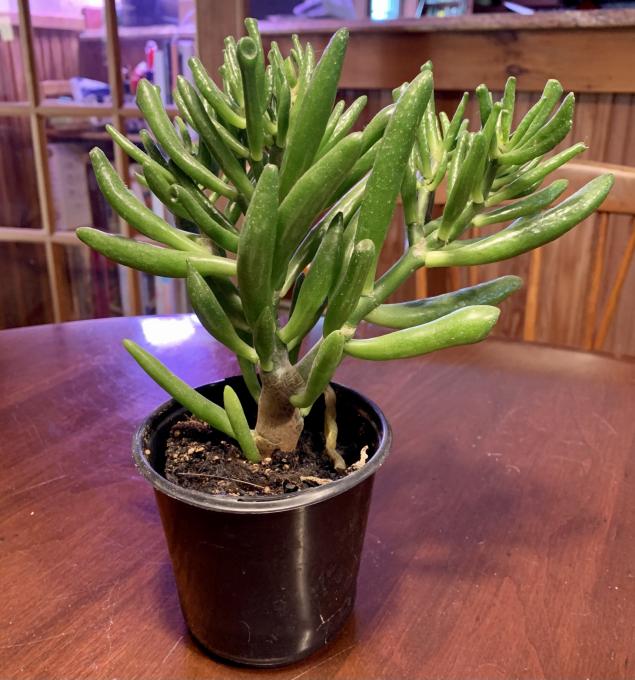
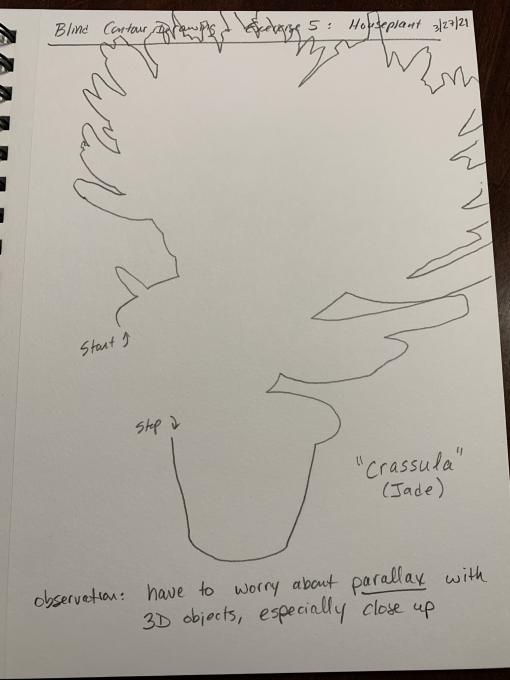
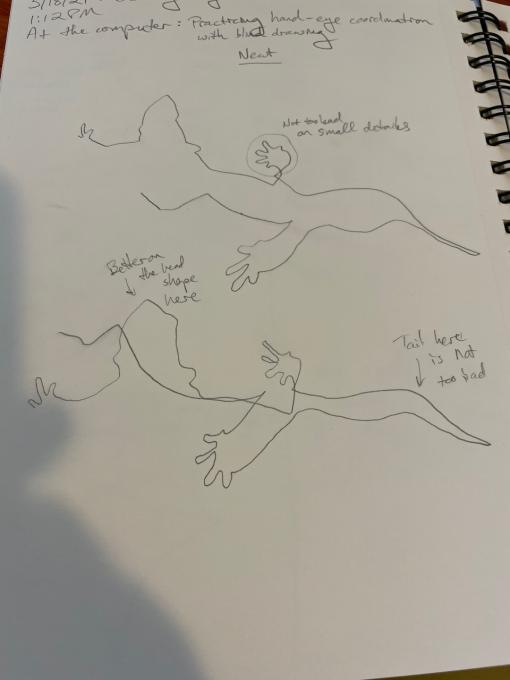
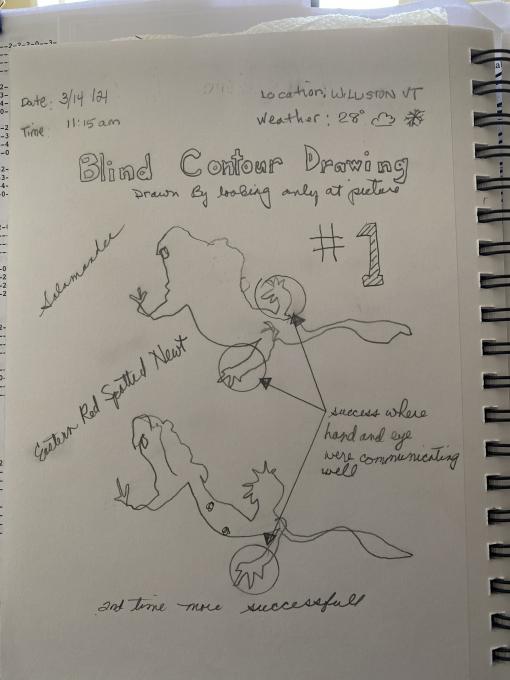 I really enjoyed this exercise. As I went from photo one to photo 4 my drawings improved. I did the first two twice each and noticed that as I concentrated on the photo and drew areas that were close together I was able to get more accuracy. I covered the sketch pad with my copied photos so I was not tempted to peek. The more I concentrated on observing the photos the more accurate my drawings became. It was fun!
I really enjoyed this exercise. As I went from photo one to photo 4 my drawings improved. I did the first two twice each and noticed that as I concentrated on the photo and drew areas that were close together I was able to get more accuracy. I covered the sketch pad with my copied photos so I was not tempted to peek. The more I concentrated on observing the photos the more accurate my drawings became. It was fun! 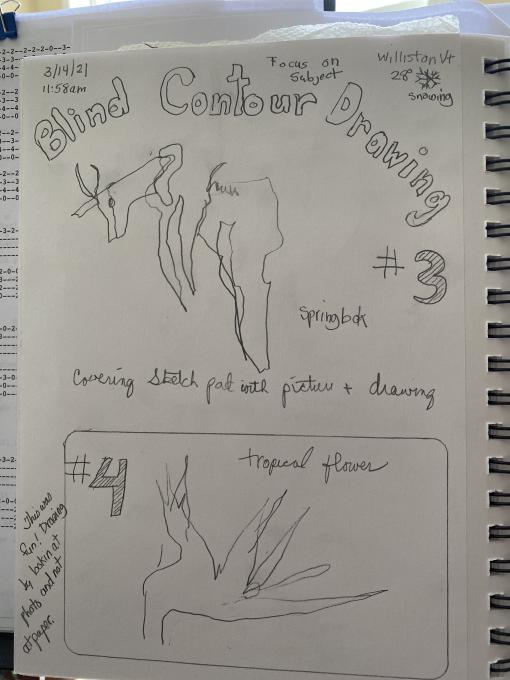 I really enjoyed this exercise. As I went from photo one to photo 4 my drawings improved. I did the first two twice each and noticed that as I concentrated on the photo and drew areas that were close together I was able to get more accuracy. I covered the sketch pad with my copied photos so I was not tempted to peek. The more I concentrated on observing the photos the more accurate my drawings became. It was fun!
I really enjoyed this exercise. As I went from photo one to photo 4 my drawings improved. I did the first two twice each and noticed that as I concentrated on the photo and drew areas that were close together I was able to get more accuracy. I covered the sketch pad with my copied photos so I was not tempted to peek. The more I concentrated on observing the photos the more accurate my drawings became. It was fun! 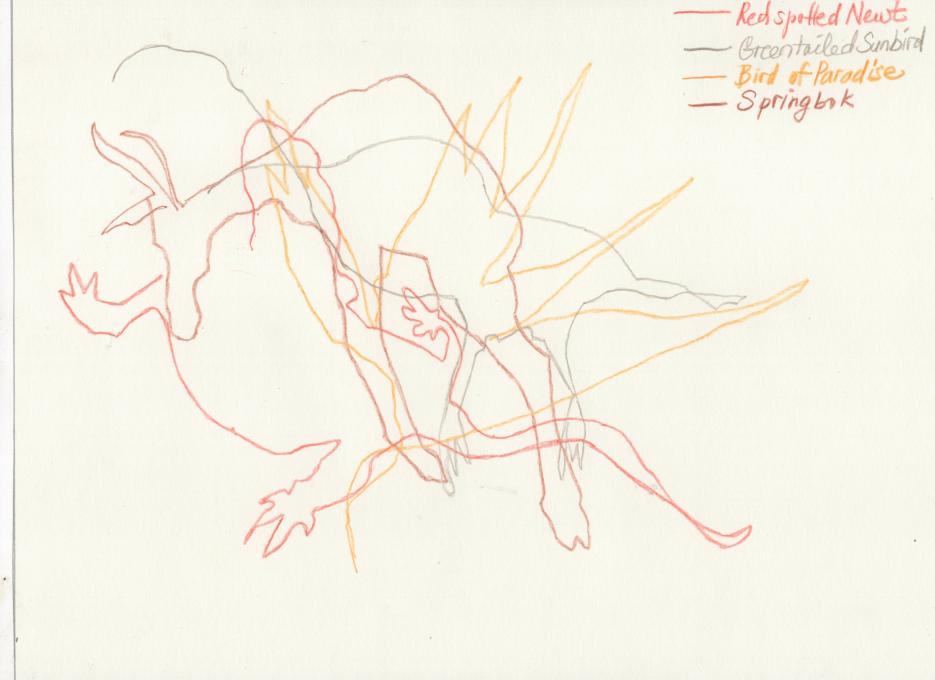 Very good exercise for focusing on the subject! I superimposed each contour drawing on top of the other, using colors of the subject that were harmonious with each other. The copper for the tropical bird didn't work, though, and looks grey. The outcome is a playful abstract design - and within the design one can see suggestions of a head-horn-ears, tail, and feet....Lots of fun!
Very good exercise for focusing on the subject! I superimposed each contour drawing on top of the other, using colors of the subject that were harmonious with each other. The copper for the tropical bird didn't work, though, and looks grey. The outcome is a playful abstract design - and within the design one can see suggestions of a head-horn-ears, tail, and feet....Lots of fun! 